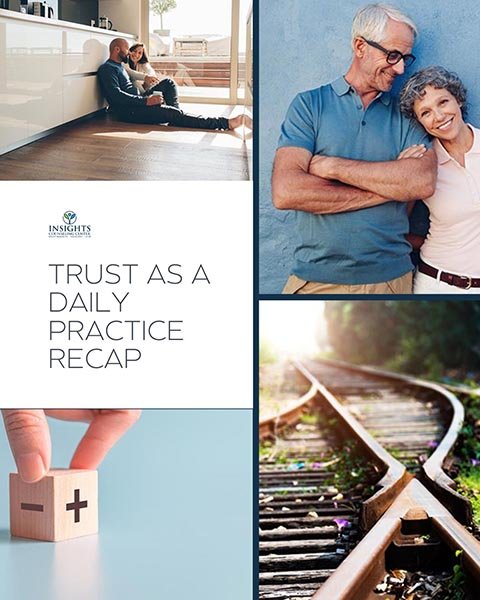Trust as a Daily Practice: Series Recap
Reflecting on What We’ve Learned—and Where to Go from Here
Trust is often seen as something you either have or don’t. Something that’s earned once and then stays strong—until it shatters. But if there’s one thread that’s run through every part of this series, it’s this:
Trust isn’t a one-time promise. It’s a daily practice.
It grows in how we show up. How we respond. How we repair.
And it begins from the inside out.
Over the last six posts, we’ve explored what trust looks like in different relationships and recovery journeys—from long-term couples to partners healing after betrayal. Below, you’ll find a summary of each post, followed by journaling prompts to help you integrate what resonates most with you.
Series at a Glance
Part 1: Why Trust Needs Constant Nurturing in Long-Term Relationships
Couples Therapy
Trust isn’t built in grand gestures—it’s built in micro-moments. We explored how turning toward, following through, and making daily deposits into your emotional bank account create the foundation for a secure connection.
Part 2: After the Fall—Why Trust Needs Daily Rebuilding After Betrayal
Betrayal Trauma
After betrayal, trust can’t be rushed. This post explored the difference between blind trust and wise trust, and why daily repair and nervous system safety are essential.
Part 3: The Work Doesn’t End—Why Trust Needs Maintenance in Recovery
Sex Addiction Recovery
Sobriety doesn’t rebuild trust—living in integrity does. We talked about emotional sobriety, ownership, and the long game of becoming someone who is safe to be close to.
Part 4: Gottman’s Trust Metric—Why Trust Needs Constant Tending
Gottman Method
Using the Gottman Repair Checklist and the concept of emotional bank accounts, this post unpacked how small moments of connection or disconnection shape the trust between partners.
Part 5: The Emotional Bond Needs Reinforcement
Emotionally Focused Therapy (EFT)
From the lens of Emotionally Focused Therapy, we explored how trust is built through emotional responsiveness and vulnerability—not perfection, but the courage to reach again.
Part 6: If You Stay—Why Trust Needs Daily Care After a Crossroads
Discernment Counseling
In relationships at a turning point, trust must be rebuilt carefully, even if the decision to stay isn’t final. Repair becomes a practice of integrity and mutual honesty.
Journaling (Choose the Ones You Want)
Pick the prompt or prompts that feel most accessible to you.
– What does being trustworthy look like for me in this season of my life?
– When do I find it hardest to trust—and what do I need to feel safe again?
– In my closest relationship, what are the micro-moments that build trust most consistently?
– If I’ve been hurt, what boundaries or rhythms help me rebuild wise trust—not blind trust?
– What would it mean to trust from the inside out—starting with my own integrity, presence, and follow-through?
More Than a Series
This series isn’t just about trust in theory. It’s about your real life. Your real relationship. Whether you’re in the early stages of rebuilding or trying to stay connected during stress, trust will always be a rhythm you return to.
You don’t have to figure that rhythm out alone.
Our therapists are here to walk with you—whether you’re healing from betrayal, navigating recovery, or trying to stay emotionally close in the middle of daily life. Call today to schedule a session and begin building the kind of trust that lasts—from the inside out.

